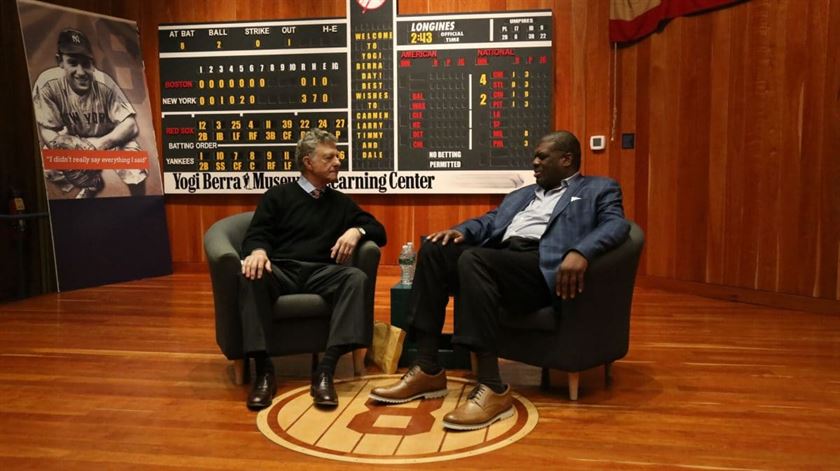It was a night for kings at Yogi Berra Museum as four-time NBA All-Star Bernard King visited the museum to promote his new book, “Game Face: A Lifetime of Hard-Earned Lessons On and Off the Basketball Court,” in which he discusses his early life as well as his collegiate and professional NBA career.
King also had a sit-down interview with Pulitzer Prize-winning sports journalist Ira Berkow on Nov. 13, where he detailed some of the highs and lows of his amazing basketball career.
Before the sit-down interview, Yogi Berra Museum had a grand opening for their new Basketball exhibit called “DUNK! The Science of Basketball.” It included a wingspan exhibit of New York Knicks center Kristaps Porzingis, as well as featuring several famous basketball artifacts.
These artifacts included a signed Patrick Ewing jersey and basketball, basketball shoes autographed by Jason Kidd, and the 1973 New York Knicks championship ring. The new exhibit is on track to increase the popularity of the museum.
During the sit-down interview in front of about 75 people, King discussed some of his early struggles growing up. His mom often physically abused him and he never truly had a connection with his father. He noted that he was constantly busy with work and focused more on his religion.
However, King referenced how basketball was something that got him through it all. It was life-changing for him, and eventually, it turned his life around.
King then went into detail on the racial discrimination he went through during his time at the University of Tennessee, where he was given a scholarship to play basketball. He mentioned that he had several clashes with police officers at the time of racial instability in the area.
However, he was still able to win the SEC Player of the Year three times, and after four strong seasons, was drafted by the New York Knicks in the 1977 NBA draft.
After several seasons of averaging 20 or more points per game, King had his breakout season in the 1984-1985 season, averaging 32.8 points per game and was named to the All-NBA First Team. However, a major knee injury near the end of the season in March of 1985 threatened to end his career.
King described the rehabilitation to get back on the court as one of the toughest things he has ever had to do.
“I had to motivate myself every day that I could come back from this,” King said. “I had a sign on my wall that said, ‘You shall not be denied.’”
King certainly was not denied, and after two long years of rehabilitation, made his return late in the 1986-1987 season for the Knicks. Although he was released the following off-season by the Knicks, a new opportunity was provided to him by the Washington Wizards in 1987. He signed with the team and had some of the finest moments in his career.
King averaged four straight seasons of 22 or more points per game, landing him a few more All-Star appearances and an All-NBA selection. This solidified what is considered to be one of the greatest comebacks in sports history.
When talking about his amazing NBA career, King mentioned one of his biggest moments was his first game at Madison Square Garden.
“I dropped 42 points that game,” King said. “That was when I knew I truly made it in the NBA.”



